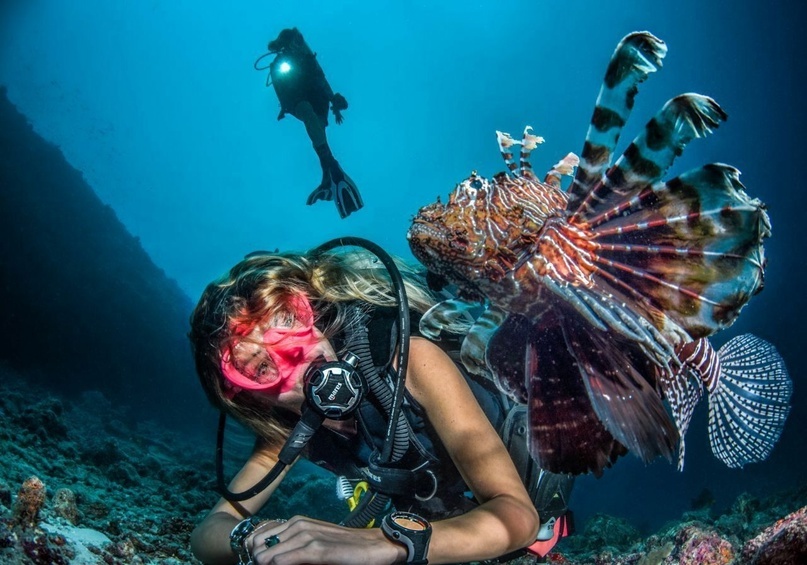
In the Indian Ocean, between the southern atolls of Addu and Huvadhoo, lies the tiny island of Fuvahmulah, one of the most famous in the Maldives. Firstly, it is the only volcanic island in the archipelago, there are beautiful freshwater lakes, mango orchards, papaya plantations, and many flowers grow here. And secondly, this place is considered one of the best in the world for diving with sharks, since in one dive you can see up to 20 tiger sharks in their natural habitat. It was for sharks that divers Irina and Petr Britanova once came here. The couple founded the diving club @Tigersharkprofi on the paradise island, from which you can dive into the amazing underwater world. From the conversation with Irina @irina.britanova.maldives we learned a lot of useful things: we learned where and how to dive safely and who a diver should really be wary of.
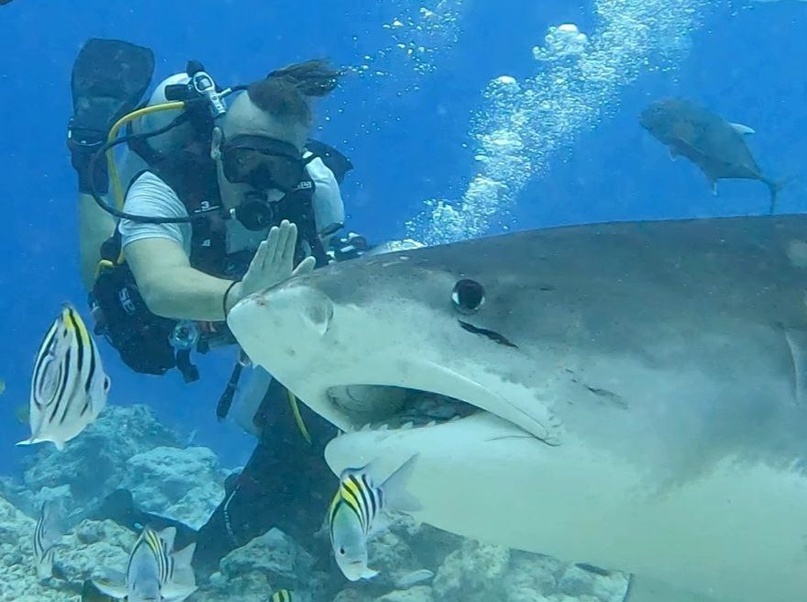
- Irina, in one of the latest videos on Instagram, your husband gives a hand signal to a shark, it turns around and starts swimming in the other direction. What is this? Can sharks, especially in their natural habitat, be trained?
I understand that for a person who is far from the diving topic, all this looks extremely strange... Let me explain.
For diving with sharks, instructors are needed, whose task is to protect people from sharks and, oddly enough, sharks from people. When a beginner swims, we cannot let a shark get close to him. And this hand gesture is a kind of stop signal, it indicates the minimum distance at which we can bring a shark to a person. And yes, sharks understand this sign: "Okay, I'll swim away, maybe it's not safe." At the same time, if another person who is not familiar with a particular shark extends his hand, we do not guarantee that it will not taste this hand. It's just that each instructor has their own ways of letting the fish know that it's time to swim away. For example, I don't put my hand out - I communicate with the fish with my eyes and I'm absolutely sure: if they see human eyes, they will never attack, they are too cowardly, although curious. So I don't even know how to answer your question about training. On the one hand, it can't be called training - we seem to let them understand some things on an energetic level. But on the other hand, if these repeatedly repeated techniques work, then they are probably elements of training.
- And how did you end up in the Maldives?
Precisely because of the sharks. There is a large population of them here, and we are the only Russian-speaking trainers in the world who work with wild "tigers". (Irina calls tiger sharks tigers. Wikipedia says that this is one of the largest species, individual "tigers" reach five meters in length, and their teeth can even bite through the shell of a turtle. - OnAir.)
"Tigers" are divers' favorites, they are very relaxed, laid-back, so to speak, you can free dive with them on your own air or scuba dive. They are very cool. My husband and I chased sharks around the world for several years - we flew out of Moscow almost every two weeks, planning our routes in such a way that sharks would definitely live in the places we were going to. And my first encounter with a shark happened like this. During a briefing, the guide told us: "If you see a shark, stick together in a group, never swim alone. A shark sees a group of people, for it this is one big object, and it is afraid. But when it sees one person, this is a small object, it can attack it." And then we saw a shark that was less than a meter long - now I understand that it was tiny, it was a whitetip reef shark that I came across. But then I was very scared and slowed down. And then all the experienced divers rushed towards it. And I realized that I also had to swim to stay in the group. I saw these eyes - the eyes of a shark. They seem to hypnotize you, the rest of the world fades in such moments. You learn to understand its intentions, to see how scared or, on the contrary, curious it is, how it wants to get to know you better...
Since then, we have been going on shark diving trips regularly. And then we trained and became instructors ourselves. The search for "tigers" led us to the Maldivian island of Fuvahmulah. It is very small: 4.5 kilometers by 800 meters. Tourists began to be accepted here only five years ago, and we were among the first. This is the only volcanic island in the Maldives, there is a beach with round small snow-white pebbles, which is very unusual for the archipelago. By the way, the beach is among the ten most beautiful in the world - it is simply incredible!
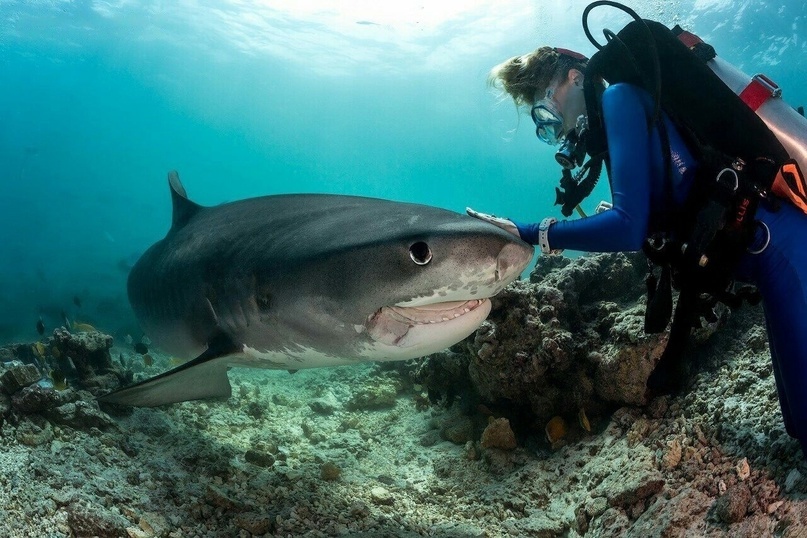
- Haven't you gotten bored with this paradise island after all these years - it's so tiny. What can you do there besides diving?
Our island is considered the richest in the Maldives. People here go fishing, go hiking, many have their own small resorts, small hotels or diving clubs. We are friends with many locals - they are very relaxed, pleasant people to talk to. They are Muslims, speak the local language Dhivehi, but the vast majority speak English well. Plus, Russian-speaking tourists constantly come, so believe me, it's not boring here at all. Besides, this climate suits me perfectly. When my husband once asked me if I was ready to leave Moscow forever, I answered "yes" without hesitation. And literally four days later we flew away. My husband hasn't been to Russia for five years, and I recently went to an exhibition where we presented our diving club. And you know what? I put on heels for the first time in 10 years. And I thought: "Oh my God, they are so uncomfortable! Why do I need them?!" I can't live without water and without sharks. But I can live without heels.
- What you do is called safety shark diving. But it's hard to ignore the terrible news of last summer, when sharks attacked tourists...
We are currently visiting guys from Hurghada, who have been running a dive club in the region where the attacks happened for a quarter of a century. They flew in with small children to swim with sharks, and today we just dived with the "tigers". And in the process, on land, of course, we talked a lot, discussed the topic of shark attacks. In Egypt, you can't build hotels on a pontoon - this is when the hotel has no sandy beach, and the depth begins immediately. But such hotels exist, and they accept everyone without exception. No one warns anyone that this is a shark habitat - their, the sharks', home. A house where people constantly come. They come without really knowing the character or habits of sharks. A person dives without a mask, without fins - just swims for fun and has no idea that at some point he may encounter a shark. And there are a lot of sharks in Egypt! For example, long-winged oceanic sharks live there - longimanus, which eat everything and follow the smell of diesel fuel. These are the very first sharks that we were lucky enough to study, we spent more than 40 weeks with them during a yacht trip. We didn’t even have to look for these sharks - they followed our boat almost all the time. So is it worth swimming or surfing in such places? Believe me, not a single professional surfer who was bitten by a shark will ever say that it was the shark’s fault. Professionals understand: if something like this happened, the person is to blame. Either he didn’t see the shark, or he was swimming in the wrong place — in a word, he came to the fish’s house and broke the usual order. And she thought that this person was edible. But it turns out he is inedible. Therefore, the shark will bite off the leg and swim away, and most likely spit this leg out on the way. Do you know what human blood smells like? And fish blood? After all, these are two completely different substances, and human blood is tasteless to a shark. In addition, we are very hot, our temperature is 36.6 — for her, this is simply scalding! Therefore, she bites and spits out. The only thing is that a tiger shark, for example, has taste buds inside, and the poor thing first swallows, and only then feels that she has bitten off something disgusting. Therefore, a shark will never react to the smell of human blood. They can smell a drop of fish blood from a kilometer away, but not human blood.
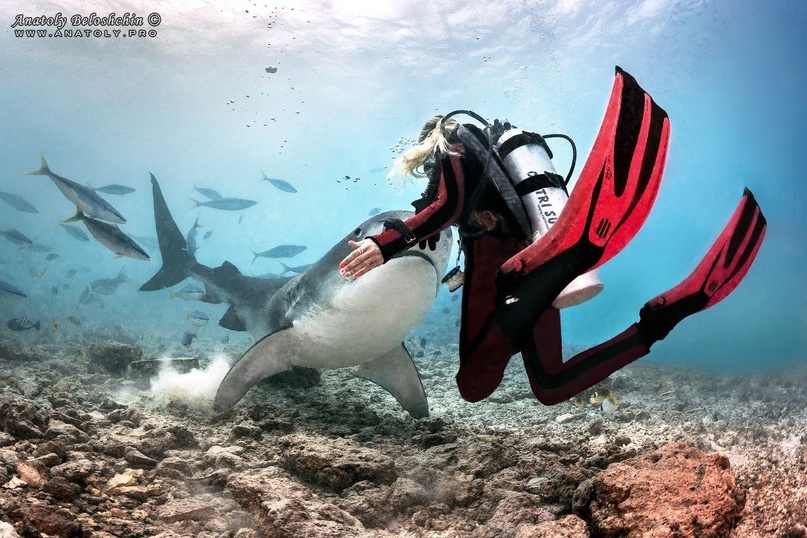
- What can a person do to avoid becoming an accidental victim?
At least ask where you are going on holiday. Do not stay in hotels with pontoons and especially do not swim there if you do not know anything about the local sharks. You can swim with them only in the presence of professionals who know the area, the underwater inhabitants and can protect you if necessary. Believe me, sharks are far from the most dangerous creatures, and we always warn our tourists about this. For example, the scorpionfish or its relative, the stonefish, look like inconspicuous pebbles and live on every reef. The pain from their bites is simply terrible. Some are literally paralyzed by it. You can always talk to sharks, tell them: “Stop! Look, I am absolutely not dangerous and not interesting to you.” They are just incredibly curious creatures and they taste everything. But they do not have hands. When a shark can't see a person's eyes, and a person can't see a shark, it will definitely swim up and try - like, some new fish is here, how interesting! Well, of course, the number of people injured by sharks still doesn't compare with the number of people killed in car accidents. Yes, there were five attacks in a year, two of them fatal. But all of them happened due to the fault of a person who simply didn't know where he came to. We prepare for a hike before going to the mountains, right? And before swimming in an unfamiliar sea, you also need to prepare thoroughly.
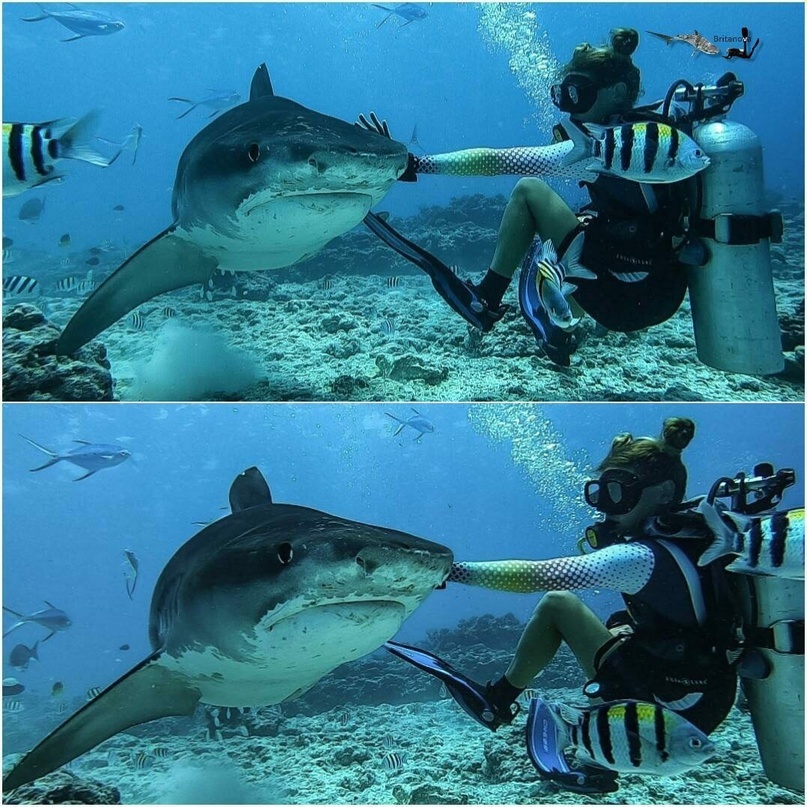
- And how safe do the sharks themselves feel? After all, people often “attack” them too...
When I first came to the Maldivian fish market, there were huge manta rays (these are rays, which are also called sea devils), all kinds of sharks and their fins on the shelves. But, thank God, in 2012, the catching of manta rays and sharks was banned, and now cases of poaching are rare. Although during the pandemic, for example, 400 kilograms of shark fins were caught here, but the poachers were detained, given a huge fine and a prison term. Imagine, these people cut out the fins of the fish, did not even kill them - the sharks just slowly died, since they could no longer hunt without fins... And so, one shark in the Maldives brings in a million dollars a year thanks to tourism. Therefore, of course, we take care of our “tigers” in every possible way.
- Do you have underwater pets besides sharks?
Oh yeah! Mantas, dolphins, whales… Our island is home to dozens of turtles that aren’t afraid of people at all. You can see them on every dive and even while snorkeling (swimming with a mask and fins. — OnAir). Since Fuvahmulah is isolated in the ocean, all the deep-sea creatures come to us periodically. Everyone who needs to eat, clean themselves, mate — all of this happens on our island. So it’s no wonder we don’t get bored here. Although when I was just learning to dive, my instructor tried to dissuade me: “Ira, don’t do this professionally under any circumstances, otherwise you’ll lose interest in the underwater world over time.” More than 10 years have passed. What can I say? There’s still nothing more interesting to me than this job.